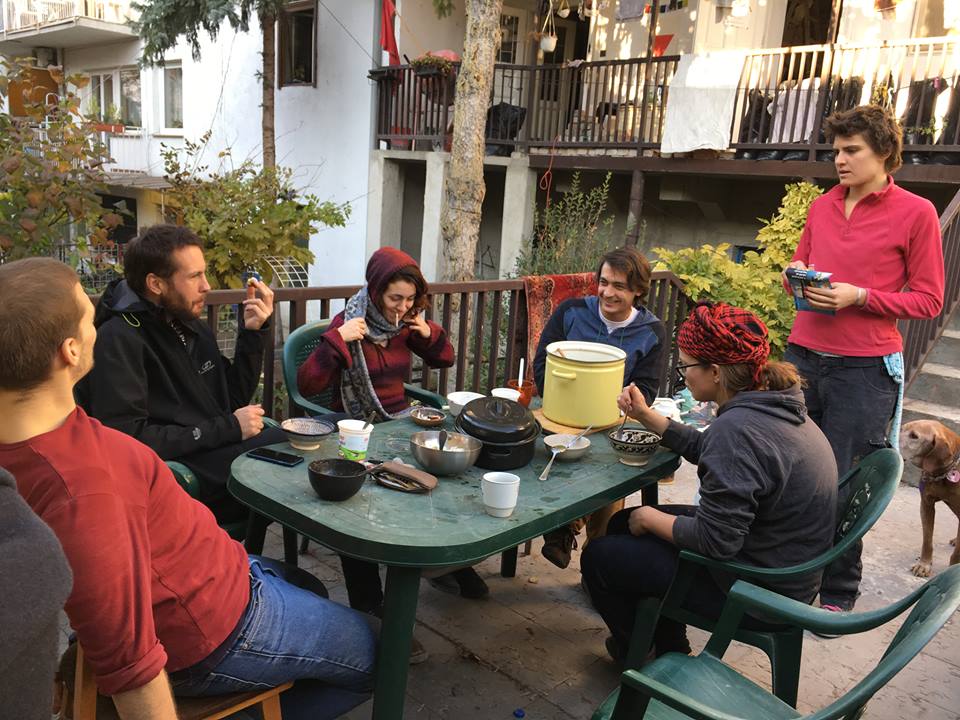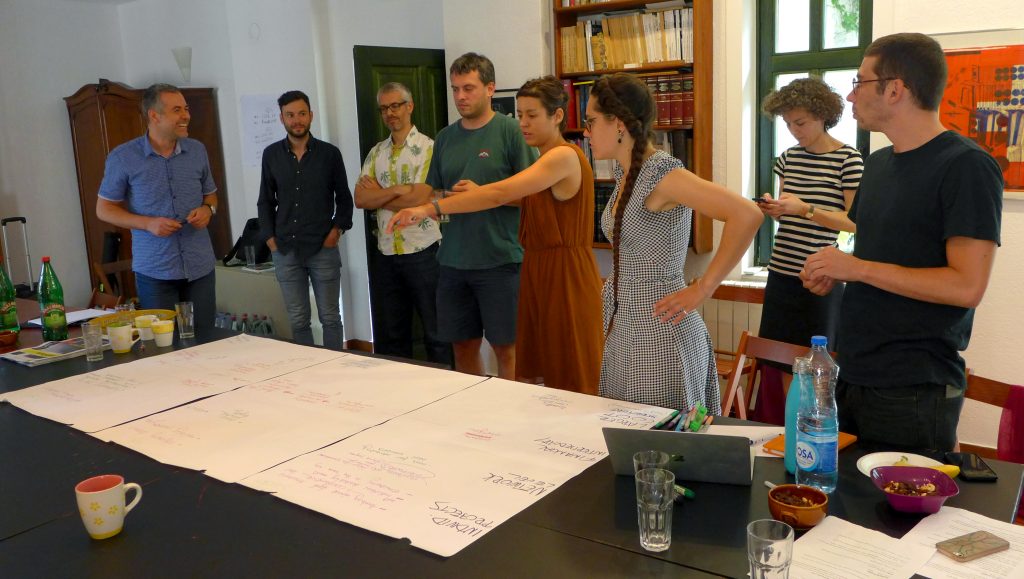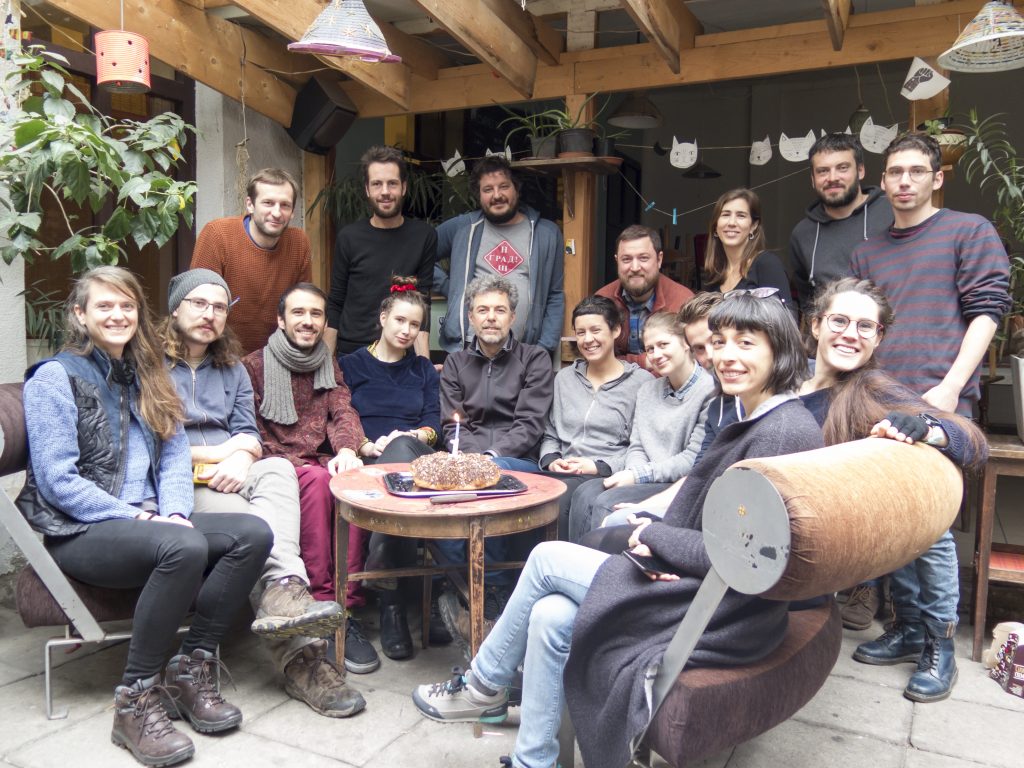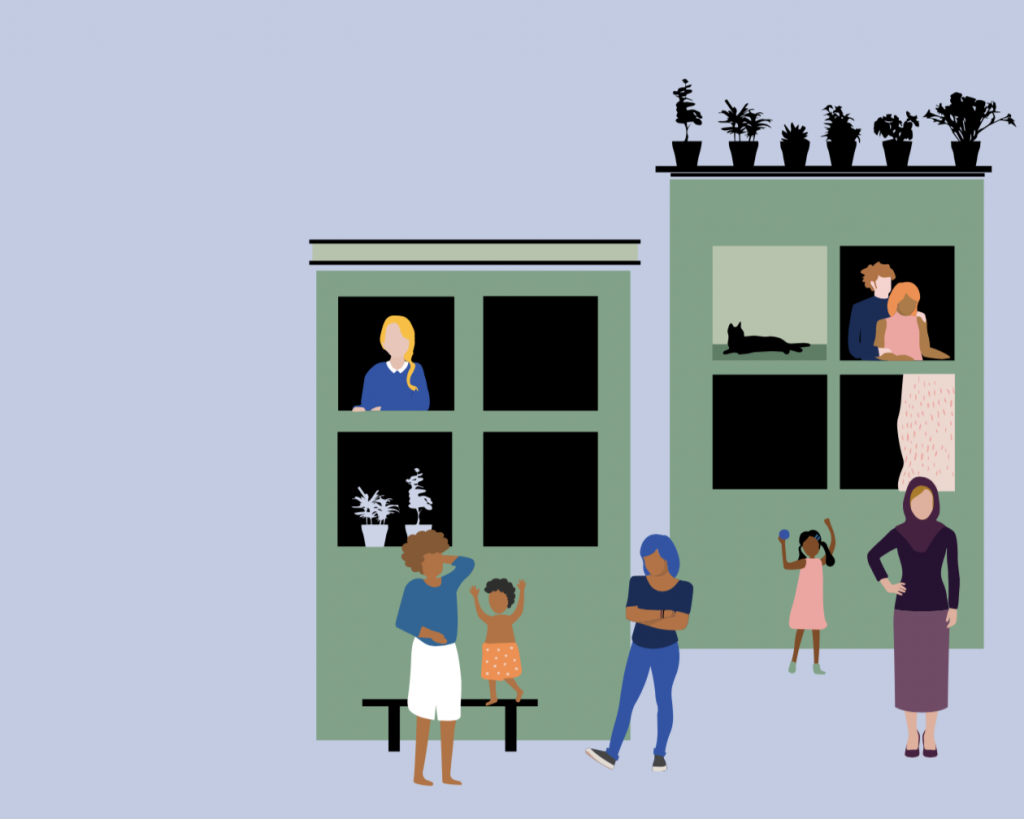This essay is part of the book El poder de las finanzas públicas para el futuro que deseamos, you can find the entire collection of essays .
The MOBA Housing Network is a collaboration of emerging cooperative housing initiatives in Central and Southeastern Europe (CSEE). Its aim is to create institutional frameworks for affordable financing for a new generation of cooperative housing in the region. The network’s name, MOBA, means ‘self-build through mutual help’ in Serbo-Croatian. The self- building of homes is a widespread, long-established popular practice in the region that reflects a structural gap between incomes and housing costs, in which households collaboratively complement the incomes they gain from formal labour markets with unpaid informal labour to secure housing needs for each other. The MOBA Housing Network emerges from the same structural context, but addresses the specific topic of housing finance. What it ‘self-builds through mutual help’ is an institutional framework that enables lower-income populations in the region to collectively access finance for affordable housing, a model for systemic transformation of local housing markets that can be applied beyond the CSEE region. Pilot projects that are under way in Budapest, Ljubljana, Belgrade and Zagreb show that the framework can be a viable alternative to provide stable, affordable, socially owned housing.

From single cooperative housing projects to a regional finance framework
MOBA came to life in 2017 when members of housing cooperative initiatives from Belgrade, Bratislava, Budapest, Ljubljana and Zagreb started to discuss and share their perspectives. Soon they recognized that the factors that slowed their progress locally had common, systemic causes rooted in the region’s position within global financial markets, and in the peculiar- ities of post-socialist housing geographies: the lack of affordable housing finance, no public support to mitigate this gap for lower-income popula- tions, and the absence of legal and institutional frameworks recognizing cooperative housing models. Coming together as bottom-up, localized collectives, MOBA pioneers decided to address these systemic limitations through building a regional institutional framework to attract, channel and manage financial flows for housing cooperatives. Coordinating strategies and advocacy were seen as the necessary ‘first step’ to scale and replicate local initiatives.
MOBA projects were launched by architects, project managers, activists, sociologists, finance experts and social organizers – a generation of professionals who grew up during the post-socialist transition started their careers around the 2008 crisis, and found themselves increasingly confronted with housing insecurity and unaffordability. Beyond personal concerns, the initiators sought to engage in hands-on projects that drive systemic transformation and to develop people-led, non-state and non-market solutions. Rooted in varied professional-institutional back- grounds and activist contexts, MOBA projects represent different locally embedded takes on similar structural deficiencies.
The group took a step back to assess the current conditions and gaps in housing finance in order to create enabling frameworks and the financial infrastructure for large-scale investment in cooperative housing. Their individual and collective stories – outlined in the boxes below – illustrate the buildup of crossovers between professional work and activism in the field of housing and urbanism in the last decade, and offer alternative models for systemic transformation of local housing markets beyond the CSEE region.
Box I
Rákóczi Collective (RK), Budapest, Hungary has been organizing with the aim of creating rent-based housing cooperatives in the country since 2012. It is run by some 15 core members and is in contact with 5-6 other aspiring co-housing initiatives. Members of RK have been catalyzers of a number of initiatives in the emerging solidarity economy ecosystem in Hungary, such as the Gólya Cooperative Bar and Community House, Periféria Policy and Research Center, Social Housing Reconstruction Camp, College for Advanced Studies in Social Theory, and the Budapest Metacooperative. Motivated by the increasingly unaffordable housing market in Budapest and their broader understanding of housing problems nationally, they explored solutions for housing affordability combined with innovative community living arrangements. Cinka Panna is the pilot housing project of RK. It is a three-storey multi-family house for nine people in a popular residential area just outside the center of Budapest, where cooperative members moved in early 2019. Along individual spaces, Cinka Panna offers shared kitchens and bathrooms, large community spaces and a garden. Capitalization is achieved through a joint investment by the cooperative members and external ‘friendly lenders and investors’ in their wider informal network (these direct private loans are expected to be partially transferred to a bank loan as soon as ongoing negotiations with a local ethical bank are over). Thanks to the financial model and energy-efficient renovation, rent levels are calculated at roughly 60 per cent of the current market price in the area. With their present capacities and once a sustainable credit line is achieved, RK would like to replicate the model of Cinka Panna.
Box II
Zadrugator Cooperative, Ljubljana, Slovenia started as an informal group in 2014 and was formally established as a housing cooperative in 2016. By 2018, Zadrugator had become the leading organization dealing with research and development in the field of housing coop- eratives in Slovenia. Their pilot project, Zadrugator Housing Coopera- tive, will be constructed as a three-storey building with apartments and common spaces close to the center of Ljubljana, on a plot pro- vided by the municipality, and is aimed to serve as a test case for developing housing cooperatives nationally. The Slovenian national housing fund is providing part of the loan, while the municipality provides the plot for the cooperative to build on. Rents are calculated at a level that is lower than market price, but allows the accumula- tion of income to reduce the risk of repayment default. To keep the rent low and prevent speculation, the local authorities retain own- ership of the plot, while the cooperative is awarded a 99-year lease.
Zadrugator is already working closely with future tenants to address their housing needs. The house will serve 125 people, mainly young families, elderly people and precarious workers. The cooperative will also enable strong social ties, thanks to 15 per cent of shared resident facilities such as a shared kitchen, mixed-use community space, a library of things and so on, to be used by residents and the local community.
Box III
Ko Gradi Grad (KGG, Who Builds the City), Belgrade, Serbia began in 2010 as an informal platform and is today one of the leading not-for-profit, citizen-led housing organizations in Serbia. KGG is tackling the housing problem using several strategies, including legal advocacy and direct action. Their ‘smarter building’ approach is the result of collective work by some 40 people. Their pilot project is a four-storey, 23-apartment building that would accommodate different living requirements, including single-user, family and co-housing arrangements, as well as shared-resident facilities. The architectural approach is modular, allowing the model to scale to up to 200 apartments within five years from the launch of the first apartment complex in Belgrade. Funding is achieved through a joint investment by external lenders and cooperative members: the cooperative invests in the construction of the building with 20 per cent equity (half member participation, half donations), while the remaining funds are obtained via a loan with a principal sum of €750,000 covering building construction. A housing cooperative (special purpose vehicle) is established as the developer, owner and operator of the building. The rent is calculated at 65 per cent of market price.
Box IV
Zaduga za etično financiranje (ZEF, Cooperative for Ethical Financing), Zagreb, Croatia is the largest cooperative in the country (1,400 members) and involves a variety of entities interested in creating an economy based on social and ecological responsibility, democracy, transparency and solidarity. Active since 2014, one of the key activities of the cooperative has been the foundation of its own financial institution, the first ethical bank in Croatia. Owned by the cooperative, the bank would provide financial services to cooperative members and external clients. At present, the cooperative facilitates financial transactions between members. Besides financial services, ZEF serves as a platform to help members coordinate to create innovative projects primarily focused on serving local communities in the fields of renewable energy, IT, agriculture and housing. Housing projects within ZEF are initiated and coordinated by Zadruga otvorena arhitektura (Cooperative for Open Architecture), a collective that deals with architectural design, research and development of sustainable architecture, and the promotion of cooperative and democratic land use, management and construction. The model for cooperative housing it has developed is being promoted by ZEF with local governments. Križevci housing is a pilot project through which ZEF, in cooperation with the city of Križevci, is planning to put its cooperative housing model into practice; the City provides the land for long-term use for free, while the future tenants are responsible for organizing in a housing cooperative to erect the building with the help of common resources. The key advantage of the model is that financial accessibility is ensured by excluding developers and by the free use of publicly owned land. Furthermore, the fact that the city preserves ownership of the land prevents the kind of speculation one sees with apartments on the real estate market.

In the process of creating MOBA, the initial four housing cooperative initiatives were joined by supporting partners: ZEF from Croatia, the open global cooperative FairCoop, the social investing service Sociálni Inovátori from Slovakia, professional housing organizations urbaMonde (Switzerland and France) and World Habitat (UK), and the Belgrade office of the Heinrich Böll Foundation. Further housing cooperative initiatives from the region that expressed their interest in MOBA will join during 2019.
The post-socialist and post-crisis context in CSEE
The financialization of housing, that is the transformation of real estate into a financial investment target and tool, pushing up prices and excluding large segments of the population from access to housing, is a global phenomenon.1 In the CSEE region, the phenomenon has some specificities that are worth mentioning, however. First, CSEE countries are so-called ‘super home ownership countries’2, with often over 90 per cent of owner- occupied housing.
Second, the conditions of mortgage-based housing also have their peculiarities in the region. By the second half of the 2000s, CSEE experienced a soaring increase in risky financial investments. This process resulted from an extension of the financialization process of Western capital, the high profits on investment gained from the region serving as a compensation for the saturation of Western and Southern European housing markets.3 Making use of the region’s financial exposure to Western banks, CSEE was provided loans with better return-on-investment conditions for capital, and greater risks for consumers, reflected by the higher rates of non- performing mortgages after 2008.
The large number of failed mortgages was aggravated by the fact that many of these were foreign currency mortgages. Hence, borrowers were forced to absorb the risk of currency exchange volatility. Banks, predominantly foreign-owned, were bailed out in the aftermath of the financial crisis, while large segments of the population became excluded from the financial market. After a temporary freeze in the housing markets that halted the buying and selling of houses, in 2015 the real estate market boomed again, and housing prices surged dramatically.
In the context of this new housing bubble, private home ownership is becoming impossible or too risky for two-thirds of households, while rental housing is unaffordable due to skyrocketing rental prices. The majority of these households have a low but stable income, representing a type of demand that would be best served by institutionally owned rental housing that matches their capacity to pay, but this market is almost non-existent in the region.
The MOBA projects were initiated based on the reasoning that cooperative housing may provide an answer to the lack of institutional or state-led housing solutions. However, it soon became clear that finance for housing cooperatives was unavailable. While housing cooperatives were an inherent part of state socialist systems before 1990, after the free market transition these structures fell apart. Shaping the legal frameworks needed to start a housing cooperative required significant research and creativity from each initiative. Financial institutions, even when sympathetic to the idea, did not recognize the cooperative housing model as a type of institution that they could fit into their existing investment products. When looking for financial actors operating on a cooperative basis, MOBA members came to realize that Western cooperative banks tend to serve CSEE for the same reasons commercial banks do: to compensate for their costs elsewhere, charging higher costs for services in a region that they consider riskier.
MOBA members were confronted with a larger set of shared challenges across the region. One of these was the question of exchange rates. As most lenders operate in a foreign currency, and as CSEE national currencies are highly vulnerable to the volatility of exchange rates, all initiatives had to ask who would bear the risk and had to find a social, ethical and democratic way of hedging against exchange rate fluctuations.
Another challenge was related to the state. When it comes to mitigating the social effects of global financial markets, the state (government) is most often expected to protect social interests against market interests. However, in current CSEE contexts where states operate under competing pressures from global markets and local oligarchies, any collaboration with government bodies raises the question of vulnerability.
Finally, one more challenge that united MOBA members was that of collective power. As individual pilot projects they had limited access to the financial actors that might have had the capacity to help establish housing cooperatives as an alternative and scalable housing solution in the region. MOBA was established to create a common, regional framework to showcase the volume and investment potential of the emerging cooperative housing sector in CSEE in order to attract the interest of financial actors. Correspondingly, MOBA dedicates a large amount of its strategic efforts to collectively pushing for change in investment practices to favour bottom- up projects.
Infrastructural capacity for investment in stable, affordable, socially owned housing
Since 2017, MOBA has been working to set up an institutional structure to serve as an intermediary able to attract and channel financial flows and manage investments for citizen-led housing solutions for lower income populations in CSEE. To this aim, the MOBA Housing Model will create a pool of cooperative housing structures in the region, with the legal and institutional capacities to receive and manage investment for individual housing cooperatives. The model consists of: 1) individual housing cooperatives for each building (with members as tenants); 2) national umbrella organizations supported by facilitation groups; and 3) a European Cooperative Society bringing the latter together. MOBA is developing a detailed, multi-scalar governance structure that ensures the secure, responsible and democratic management of the system.

MOBA members think this model provides long-term stability for affordable housing for several reasons. First, it is supported by the expertise assembled in MOBA, and its connections with local housing markets and related social, financial and governmental actors. Second, rent is calculated below market price, so a large and constant demand is guaranteed by the market environment. For investors, the rent model at 50-60 per cent of the market price secures a stable cash flow, while remaining affordable for tenants and increasing disposable income for individual housing cooperatives for their long-term financial sustainability. Third, one of the main achievements of the model is that it transfers financial risks associated with loans from individuals to the institutional level of the cooperative. This risk is then carried by individual cooperatives (buildings), to guarantee the stability of the system. Meanwhile, solidarity support at the level of the cooperative system guarantees a more flexible and robust management of risks through security funds, mutual investments and guarantees, which make it possible to use and re-use internal funds for stabilizing the situation of members with temporary payment problems. Finally, MOBA members expect that by mediating between large financial actors and local demand, the MOBA model can make investment cheaper and more accessible for those households that need it most. This is due to the fact that the patient capital for the cooperative housing model in the region is there but is discouraged by local regulations and retail markets. Acting as a non-profit and democratically controlled facilitator, MOBA’s institutional model could open a window of opportunity for investment into citizen-led affordable housing.
In the long run, MOBA members think of their project as driving out real estate from the market and putting an increasing volume of housing stock into democratically managed cooperative structures. When designing the collective ownership, shared management and cohabitation principles, MOBA looks beyond aspects relating to housing and finance and sees itself as part of an ecosystem of actors driving societal transformation. A robust cooperative housing system, managed according to the principles of equal participation, democracy and solidarity, has the potential to become a cornerstone of solidarity economy circuits. Not only are stable and affordable rents beneficial to individual households, they can uplift society more broadly through an increase in disposable income, free time and collective organizational capacity connected to the broader social and solidarity economy. MOBA is looking to expand its cooperation with supporting partners ZEF and FairCoop, and is taking steps to contact unions, pension funds and various local solidarity economy initiatives.
MOBA is an example of bottom-up innovation for institutionalized solidarity, in one of the spheres where the current financial system hits life- worlds most directly: housing finance. MOBA has been created by members of a new generation of activists and professionals who are starting to build institutional structures in the field of cooperative housing, patient finance and the social and solidarity economy in post-socialist countries. As an initiative that strives to build solidarity finance solutions from the bottom up, its story is not one of accomplished victories, but one of resolution and creativity put at the service of imagining and constructing alternatives in an environment in which they are crucially lacking.
The article benefited from comments by MOBA members. Research on the context was done as part of an ongoing research project funded by the Swedish Research Council FORMAS (Grant No. 2016-00258).
About the author
Agnes Gagyi is a social researcher, focusing on poli- tics and social movements in East Central Europe, from the perspective of the region’s long-term global integration. Presently she works on a research project regarding housing, social movements and urban governance in the region at the University of Gothenburg, Sweden. She is a member of the housing cooperative initiative MOBA and a member of the Working Group for Public Sociology ‘Helyzet’ in Budapest.

Notas
1 Aalbers, Manuel B. (2008) ‘The financialization of home and the mortgage market crisis’, Competition and Change 12(2): 148-166.
2 Ammann, W. and Katerina, B. (2013) ‘Implications for housing privatization for Europe’, Housing Finance International: 2013(1): 15-20.
3 Raviv, O. (2008) ‘Chasing the dragon east: exploring the frontiers of Western European finance’ Contemporary Politics 14(3): 297-314.
